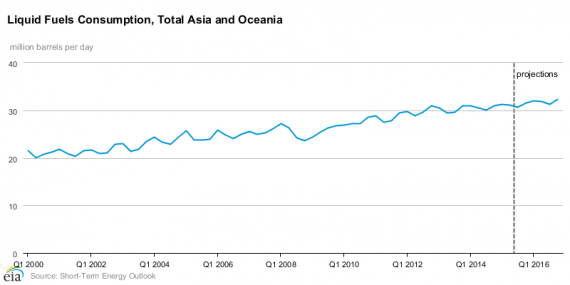New Article: How Asia is Shaping the Future of Energy

More on:
What caused the big oil crash of 2014? If you said the U.S. oil boom or Saudi strategy, you’re only partly right. As I argue in a new essay in the July/August issue of Foreign Affairs, if you want to understand current energy developments and future prospects – whether you’re talking about oil or gas or coal or renewables, and about economics or security or environment – you need to pay attention to Asia.
Here’s a deep dive into one of the facts I mention in the article. (There’s nothing this technical in the actual piece!) The chart below shows Asia and Oceana oil consumption over the last fifteen years along with U.S. government projections for the next year or so. (All data is from here.) From the end of 2009 through the end of 2012, consumption increased by an average of 1.36 million barrels a day each year. From the end of 2012 through the end of 2014, in contrast, consumption was essentially flat.
Why does this matter? The Energy Information Administration estimates that global production exceeded global consumption by about 1.8 million barrels a day during the fourth quarter of 2014. That glut is why oil prices crashed. Had Asian oil consumption growth maintained its pre-2012 pace over 2013 and 2014, global consumption (all else equal) would have been 33.6 million barrels a day in the fourth quarter last year – 2.7 million barrels a day higher than it actually was. There would have been no oil glut and no price crash. Even if Asian consumption had grown at half its previous pace, the production surplus would have been small. These claims remain true even if one excludes 2010 (which featured recovery from the financial crisis) and 2011 (when Japan imported more oil to cope with the Fukushima disaster).
Oil consumption is only one way in which Asia remains central to global energy despite all the headlines generated by changes in the United States. This link to my Foreign Affairs article should get you free access for a while. I welcome readers’ thoughts.
More on:
 Online Store
Online Store
